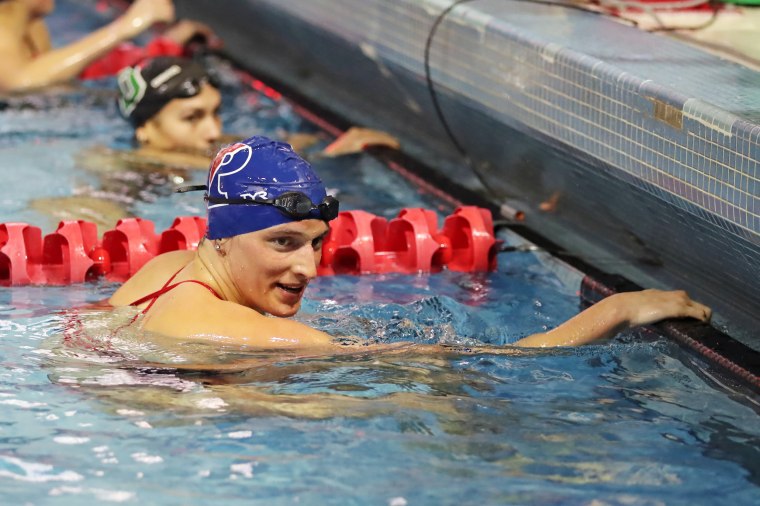University of Pennsylvania swimmer Lia Thomas will likely be eligible to compete in both the Ivy League and NCAA championships after the NCAA announced that it will not adopt USA Swimming’s stricter new policy for transgender athletes ahead of this year’s championship selections.
Following guidance from the NCAA’s internal subcommittee on competitive safeguards and sports medicine, the NCAA Board of Governors decided Thursday that there would be no changes to a policy it approved last month for trans athletes who intend to compete in the swimming and diving championships.
Phase one of that policy requires that trans female athletes have testosterone levels below 10 nanomoles per liter of blood — a threshold previously used by the International Olympic Committee — and submit medical documentation of their levels four weeks before championship selections, or by Feb. 21.
This means that Thomas, whose wins in three events at a meet in December set off a media firestorm and fueled an ongoing debate about trans inclusion in sports, will likely be eligible to compete at the NCAA championships in March.
But a spokesperson for Penn Athletics couldn’t confirm her eligibility.
“Penn Athletics is aware of the latest update from the NCAA regarding eligibility for the 2022 Women’s Swimming & Diving Championships and we are continuing to work with them regarding Lia Thomas’ eligibility,” the spokesperson said in an email.
The decision from the NCAA is the latest update in a series of policy changes set off by the organization’s decision last month to scrap its 2011 guidance for transgender female athletes, which required one year of testosterone suppression treatment and didn’t include a limit for testosterone levels.
The policy announced Jan. 19 — which took effect immediately, but will be enacted in three phases — uses a sport-by-sport approach, similar to that of the International Olympic Committee. NCAA athletes will look to the trans athlete policy for their sport’s national or international governing body, which for swimming are USA Swimming and FINA, though neither had a clear policy at the time.
As a result, when the NCAA developed deadlines and testosterone thresholds for the 2022 championships, it used the International Olympic Committee’s 2015 trans athlete policy, which uses a testosterone threshold of 10 nanomoles per liter of blood.
Mount Sinai Health System considers normal measurements on testosterone serum tests for cisgender men, who identify with their assigned sex at birth, to be 10 to 35 nanomoles per liter. When someone assigned male at birth undergoes testosterone suppression treatment as part of transition, their testosterone levels will drop significantly, usually to under 2 nanomoles per liter, which falls within the average range for cisgender women, according to Mount Sinai.
Last week, USA Swimming released a new policy for transgender athletes. It requires athletes competing in elite events — and those as young as 13 who want to be eligible to set national records — to have documented testosterone below 5 nanomoles per liter of blood for 36 months. They also must provide evidence that going through puberty as their sex assigned at birth does not give them “a competitive advantage” over their “cisgender female competitors.”
A panel of three independent medical experts will be charged with reviewing applicants and implementing the policy.
But the new USA Swimming policy does not automatically apply to NCAA or Ivy League events, which are not included on its list of elite competitions. In addition, a spokesperson for the NCAA said that athletes wouldn’t be required to submit documentation of their testosterone levels over a period of time until phase three of the policy is implemented in the 2023-24 season. In the meantime, they will just submit documentation once, four weeks ahead of championship selections.
After reviewing USA Swimming's new testosterone threshold, the NCAA said in a statement Thursday that its subcommittee decided that implementing additional policy changes at this time "could have unfair and potentially detrimental impacts on schools and student athletes" who plan to compete at the 2022 women's swimming championships.
It added that USA Swimming’s policy was also released after the start of the four-week window ahead of championship selections, during which athletes would be required to submit testosterone lab results. It said that the subcommittee will take USA Swimming's policy into account when recommending future updates to eligibility requirements over the next two academic years.
The NCAA released this latest update on the same day that more than 300 members of the swimming community signed an open letter to the Committee on Competitive Safeguards and Medical Aspects of Sports in support of Thomas. The letter was organized by Athlete Ally, an LGBTQ sports advocacy group, and Schuyler Bailar, the first trans athlete to compete in any sport on an NCAA Division I men’s team.
“We love swimming for the lifelong, invaluable lessons it has taught us about hard work, discipline, and the power of being part of a team,” the letter says. “No one should be denied the opportunity to have their life changed through swimming simply because of who they are."
Thomas has received both support and opposition from her teammates: Several of them released a statement in support of her early last week, and then a few days later, 16 teammates and their families joined an open letter applauding USA Swimming’s new policy for transgender athletes and arguing against Thomas’ participation in the Ivy League Championships.
A spokesperson for the Ivy League said in an email that USA Swimming’s policy will not affect Thomas’ eligibility for the championships, which will take place next week at Harvard.

